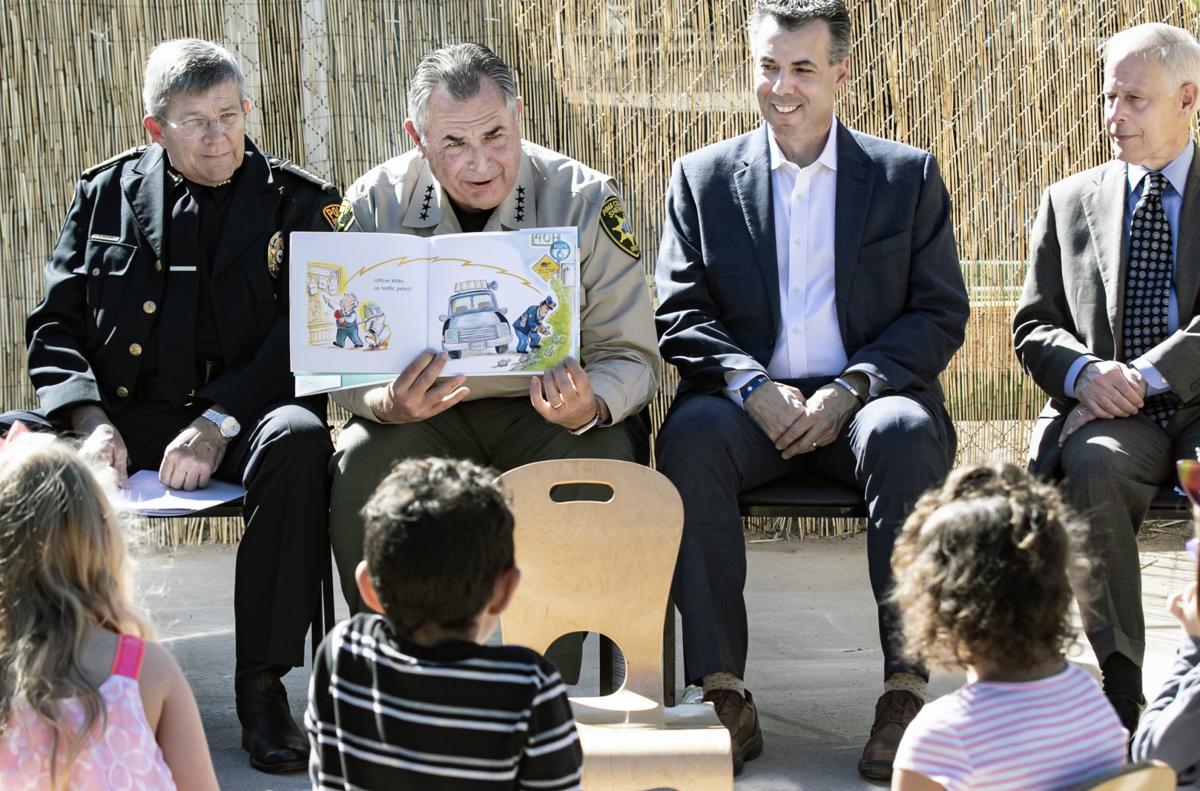More than 70 percent of Arizona’s young adults are ineligible for military service because they are not physically fit, lack basic skills or have a criminal record.
That bleak finding on military readiness was cited by retired U.S. Army Gen. Richard Zahner as he called for Arizona to fund what he says could turn it around for the next generation: high-quality care for young children.
Zahner was joined at a news conference Thursday by Oro Valley Police Chief Daniel Sharp and Republican Pima County Sheriff Mark Napier, who both said quality early childhood education is an investment that cuts crime. They are asking Arizona lawmakers to pass two child-care bills sponsored by state Rep. Michelle Udall, a Mesa Republican.
The trio of military and law enforcement officials, along with Arizona businessman Adam Saks, are members of the Council for a Strong America, a national, bipartisan nonprofit that promotes healthier communities through early intervention and prevention. The organization recently released two reports, one national and one on Arizona, illustrating how high-quality, affordable child care helps prevent crime and bolsters the economy.
Even national security is at risk, said Zahner, who called Arizona’s situation a crisis.
Udall’s proposals, House Bills 2125 and 2124, would allow Arizona to tap into $56 million in federal dollars that’s been available, but unused, for nearly a year. Republican Gov. Doug Ducey has asked lawmakers to pass the bills and authorize use of the funds after the spending was not approved during the 2018 legislative session.
One reason the funding was not approved a year ago was that it was brought to legislators’ attention late in their session, Rep. Regina Cobb, a Kingman Republican, has said. She said the state’s Department of Economic Security did not have it in its budget and so it was unclear how the funds would be spent.
This year’s bills that involve new spending will be decided in state budget negotiations which won’t begin in earnest until April.
In March 2018, Congress approved spending $5.2 billion to increase funding for the federal Child Care Development Block Grants program in all states. The $56 million is Arizona’s share of that, and requires no new match of state dollars.
Arizona can use the funds either by providing subsidies for child care to families in need or by increasing the quality of existing child-care or preschool programs. Arizona has not raised child-care reimbursement rates in more than 18 years, which translates to low wages for child-care workers and high teacher turnover in preschools and centers.
Having the money sit unused is particularly frustrating to advocates considering the state’s high rate of child neglect and the correlation between neglect and lack of access to child care, said Dana Naimark, director of Arizona’s Children’s Action Alliance, a bipartisan nonprofit that promotes child and family well-being.
Funds would help 5,000-plus more kids
If this federal money is activated, more than 5,000 more children could be enrolled, Ducey’s office has said.
As of Feb. 15, there were 2,213 children on the DES’ waiting list for taxpayer-subsidized care. However, child advocates say that list is not a good way to gauge need because it tends to be so long people stop bothering to sign up. Other times, people have been waiting long enough that they need to be re-evaluated to see if they still qualify.
Children of military parents automatically have access to high quality care, Zahner said, and “children in civilian families deserve the same quality of child care.”
Sharp, the Oro Valley police chief, said it’s unacceptable that a lack of access to child care has become the norm in Arizona. He said children who learn to read and develop social-emotional skills early on are far less likely to drop out of school or commit crimes.
Napier agreed, calling early childhood education the “pathway toward prevention.”
The recent reports by the Council for a Strong America show about 22,200 children in Arizona cannot access any kind of consistent care, and this is especially true of families living in rural parts of the state. Instead, families have to rely on a variety of alternatives, and this means their children are moving around a lot and are sometimes left in unsafe situations.
The cost for an infant to be in care is about $11,000 per year, or about 41 percent, on average, of a single parent’s income in Arizona.
The Strong America study says that, nationally, parents lacking access to child care cost the country about $57 billion annually in lost earnings, lost revenue and low productivity.
Often, young adults are trying to enter the workforce without the education or the work ethic to succeed, said Saks, president of the Dynamic Entertainment Group, which is based in Maricopa County.
“How many children are being left behind,” he said, “because they are not prepared to be that ready hire?”
Separate effort at county level
Pima County can’t count on the state to help its working-poor families access high-quality preschool, said Kelly Griffith, executive director of the Tucson-based Center for Economic Integrity.
Griffith, through the Pima County Preschool Investment Program, is looking for local support to help families and preschools here. She will be speaking before the Board of Supervisors May 14 to promote child-care funding as a regular part of the county budget.
As of 2017, there were 27,000 children ages 3 and 4 in Pima County, but only about 20 percent were enrolled in a high-quality preschool.
Changing that, she said, would “change who we are as a community in a generation.”





